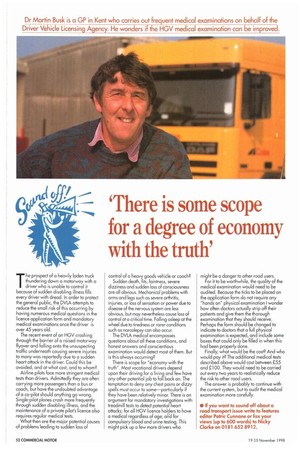'There is some scope for a degree of economy with the truth'
Page 54

If you've noticed an error in this article please click here to report it so we can fix it.
Dr Martin Busk is a GP in Kent who carries out frequent medical examinations on behalf of the Driver Vehicle Licensing Agency. He wonders if the HGV medical examination can be improved.
The prospect of a heavily laden truck thundering down a motorway with a driver who is unable to control it because of sudden disabling illness fills every driver with dread. In order to protect the general public, the DVLA attempts to reduce the small risk of this occurring by having numerous medical questions in the licence application form and mandatory medical examinations once the driver is over 45 years old.
The recent event of an HGV crashing through the barrier of a raised motorway flyover and falling onto the unsuspecting traffic underneath causing severe iniuries to many was reportedly due to a sudden heart attack in the driver. Could this be avoided, and at what cost, and to whom?
Airline pilots face more stringent medical tests than drivers. Admittedly they are often carrying more passengers than a bus or coach, but have the undoubted advantage of a co-pilot should anything go wrong. Single-pilot planes crash more frequently through sudden disabling illness, and the maintenance of a private pilot's licence also requires regular medical tests. What then are the major potential causes of problems leading to sudden loss of control of a heavy goods vehicle or coach? Sudden death, fits, faintness, severe dizziness and sudden loss of consciousness are all obvious. Mechanical problems with arms and legs such as severe arthritis, injuries, or loss of sensation or power due to disease of the nervous system are less obvious, but may nevertheless cause loss of control at a critical time. Falling asleep at the wheel due to tiredness or rarer conditions such as narcolepsy can also occur. The DMA medical encompasses questions about all these conditions, and honest answers and conscientious examination would detect most of them. But is this always occurring? There is scope for "economy with the truth". Most vocational drivers depend upon their driving for a living and few have any other potential job to Fall back on. The temptation to deny any chest pains or dizzy spells must occur to some—particularly if they have been relatively minor. There is an argument For mandatory investigations with treadmill tests to detect potential heart attacks; for all HGV licence holders to have a medical regardless of age; ad for compulsory blood and urine testing. This might pick up a few more drivers who might be a danger to other road users. For it to be worthwhile, the quality of the medical examination would need to be audited. Because the ticks to be placed on the application form do not require any "hands on" physical examination I wonder how often doctors actually strip off their patients and give them the thorough examination that they should receive. Perhaps the form should be changed to indicate to doctors that a full physical examination is expected, and include some boxes that could only be filled in when this had been properly done. Finally, what would be the cost? And who would pay it? The additional medical tests described above would cost between £55 and £100. They would need to be carried out every two years to realistically reduce the risk to other road users.
The answer is probably to continue with the current system, but to audit the medical examination more carefully.
• If you want to sound off about a road transport issue write to features editor Patric Cunnane or fax your views (up to 600 words) to Nicky Clarke on 0181 652 8912.
















































































































